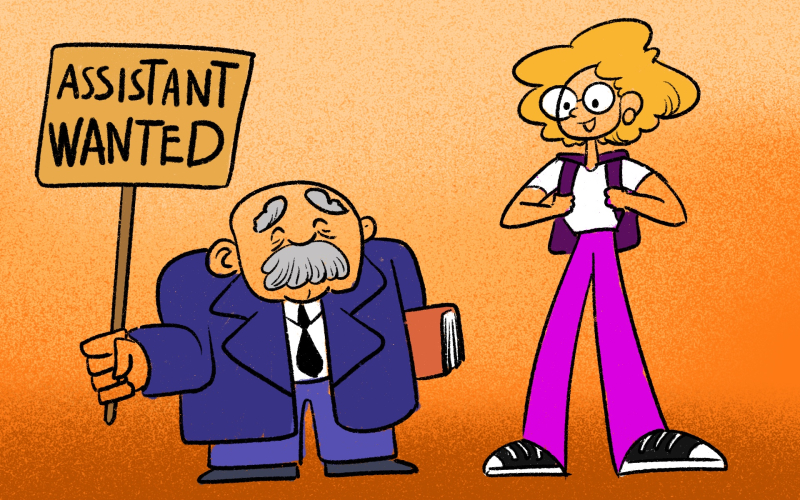Contents:
- Who can be a teaching assistant?
- What are the duties of an assistant?
- What skills should an assistant possess?
- Where can I train to become a teaching assistant?
- What benefits do the assistants receive?
- What are the participants’ future prospects?
Who can be a teaching assistant?
The position of a teaching assistant is open to students starting from the second year of their Bachelor’s studies. It is assumed that the assistant has previously completed all of their lecturer’s courses and, consequently, is able to share their experience with the students. The same requirement also applies to assistants who are enrolled in a Master’s program. They can choose to work either with Bachelor’s or with first-year Master’s students.
Illustrations by Dmitry Lisovsky for ITMO.NEWS
What are the duties of an assistant?
Preparing for lectures and seminars. Assistants do not actually teach by themselves, but they help lecturers prepare instructional materials for lectures and seminars.
Helping students manage their homework and tests. While only lecturers can grade their students’ work, assistants also keep track of the students’ academic performance, give feedback and share their know-how in order to help students deal with difficult tasks.
Helping with exams. Assistants can’t conduct exams on their own, but they can help out with organization by compiling questions into cards or filling out the relevant paperwork.
Consulting students. Assistants act as mentors, helping students make sense of the course content while also answering their questions. They are always ready to offer help with any difficulties that may arise.
Helping with course projects. Assistants guide students through the process of working on their course projects.
What skills should an assistant possess?
A teaching assistant:
- knows the basic principles of teaching;
- understands how to build rapport with students;
- knows how to motivate students and map their progress;
- is able to organize course contents efficiently;
- has good public presentation skills;
- stays in constant communication with both the lecturer and the students;
- is able to set goals for themselves and meet them independently.
Illustrations by Dmitry Lisovsky for ITMO.NEWS
Where can I train to become a teaching assistant?
Yandex will take care of all the training. All winners of the contest will first have to complete an online course consisting of five modules on the following topics:
- The goals and objectives of a teaching assistant
- Teaching adults
- Class structure, methodology, and working with instructional materials
- Grading systems, tests, and homework
- Fields where an assistant’s work experience might be useful
Participants can take the course at their own pace, but it must be completed by the middle of August.
The second stage is a three-day intensive training program at the company’s facilities. Yandex’s employees will use real cases to teach the participants how to utilize modern digital tools and technologies, such as data analytics, for education.
What benefits do the assistants receive?
Yandex will provide a monthly stipend of 10,000 rubles to all 100 winners of the contest. The stipend will be paid from September 2023 until June 2024. Assistants are expected to work for no more than 10 hours per week.
Illustrations by Dmitry Lisovsky for ITMO.NEWS
What are the participants’ future prospects?
The obvious option is to pursue a career in education, seeking employment either at a university, school, or any other institution, such as Yandex, which has a number of educational initiatives.
Additionally, this experience will surely come in handy in a business environment. In the future, former teaching assistants might find it easier to develop their careers or manage teams in a more empathetic and thoughtful manner.
To learn more about the project and learn how to apply, visit the program’s website (available in Russian only).





